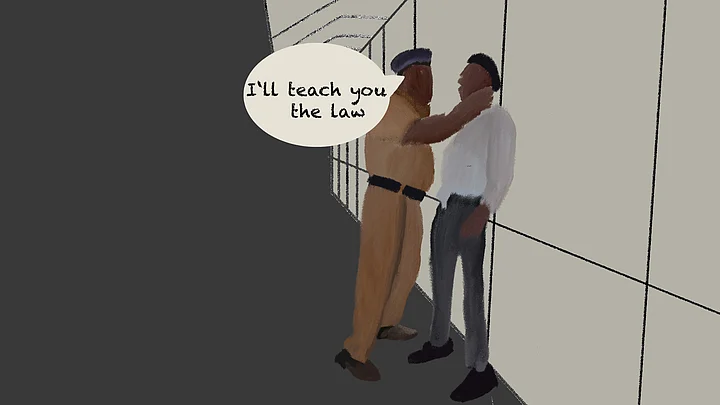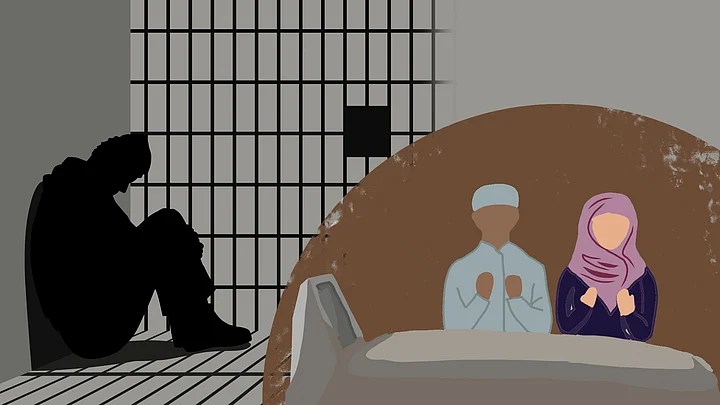On 6 March 2020, a court in Surat acquitted 127 men of all charges of terrorism. The acquittal freed 122 of these men after 20 years of incarceration. But the remaining five couldn’t breathe the same air of freedom.
They had died during the trial.
They died as accused, spending the last years of their lives tagged as terrorists, tags that were untrue. That they were exonerated posthumously means little.
These 127 men are not the first or the last victims of what is colloquially called ‘miscarriage of justice’. On 26 July 2019, Ali Mohammad Bhat, a Kashmiri weaver, was acquitted in the Lajpat Nagar blasts case after surviving prison for 23 years. Vishnu Tiwari, who was just 23 when he was sentenced to life on a rape charge, was acquitted on 2 March 2020 by the Allahabad High Court. He was 43 when he emerged from prison.
The list of persons failed by the criminal justice system is long, with most names remaining anonymous. While some are able to get compensation from the court, others are denied—but all are irreparably harmed. Interviews conducted with 10 persons in Delhi still awaiting compensation the state owes to them for wrongful prosecution reveal that suffering of the soul doesn’t come with a price tag. Their narratives force us to think and rethink ‘compensation’ for the miscarriage of justice.
Stuck in Purgatory, Rights Forgotten
Vijay, a carpenter from East Delhi, was acquitted in November 2019 over an attempt to murder charge. He had maintained that he had not even been present at the crime scene, a fact that the court finally confirmed. But Vijay had to spend six years in prison before his innocence was legally proved. The six years in prison, apart from the physical and emotional trauma, gave him an ailment that he will have to nurse for life.

I was completely healthy when I was sent to prison. But the food and sanitation there was bad, my kidneys just couldn’t take it. Despite my ailment, I kept getting the same food. Now I have a kidney problem and have to pay for my dialysis every month. Prison damaged me, and I’m still paying the cost of it, even after my release.Vijay
Till his release, Vijay was one of the 3.28 lakh persons who have been languishing in India’s prisons as undertrial prisoners. As per the latest data, 70% of India’s incarcerated population are people who are still awaiting the conclusion of their trial—who, as per the law, are innocent until proven guilty.
As India’s conviction rate has consistently remained 50% or less for the past few years, it is likely that half of these 3.28 lakh undertrial prisoners will also be declared innocent. However, till then, they will have to survive the horrors of imprisonment reflected in the rising rates of custodial violence, prison suicides, and overcrowding in dingy cells and barracks.
Often the time spent by these undertrial prisoners is almost as much as the sentence prescribed for the offence they are accused of. As of 2019, nearly 22 lakh criminal cases had been pending for over 10 years. Due to such high pendency of criminal cases, the share of undertrials confined in prison for more than one year, more than three years and more than five years has only increased between 2000 and 2019.

On 13 March 2021, the Calcutta High Court decided to initiate suo motu proceedings to examine the case of Dipak Joshi, a Nepali citizen, who has been languishing in Dum Dum jail for over 41 years. A letter from Nepal’s Consulate General, which brought this case to the court’s attention, states that Joshi has the “mindset of a child not more than 9-10 years of age”.
Section 436A of the Criminal Procedure Code provides that an undertrial prisoner, who has spent time in prison equivalent to one-half of the maximum sentence prescribed for the offence he’s charged with, can be released on bail by furnishing a personal bond. However, this provision doesn’t extend to undertrials charged with offences punishable with death; and even for the rest, the court can order the continued detention of such a person for a period longer than one-half of the sentence.
On 4 January 2021, the Delhi High Court issued notice to the Delhi Government in a petition moved by India Undertrial Prisoner Support Forum seeking release of undertrials who are languishing in Delhi’s prisons due to lack of implementation of Section 436A of CrPC. The petition states that over 1,200 undertrials in Delhi’s Tihar prison complex have completed half of their maximum sentence but only 416 such prisoners have been released.
Amar, who used to work at a ticketing counter in a mall, was picked up by the police and later tortured for recording a video of two policemen taking bribe from local hawkers. Later, he was remanded to judicial custody for an offence under the Arms Act, which he claims was fabricated by the same policemen right in front of his eyes!
Now, out on bail, Amar thinks it's near impossible for him to get his life back on track. National Human Rights Commission had directed the Delhi Government in February 2020 to grant compensation to Amar for the wrongs committed against him. However, more than a year later, Amar is yet to receive that money.
“I know they (police) registered a false case against me, they (police) also know that. Maybe, the court also knows that, but I know I’m doomed for life. The newspaper reports, the photos of my arrest leaked by police to newspapers, made me a criminal in the public eye. Nobody wants to give me a job now, no girl would ever marry me.”Amar, fighting a case registered against him under the Arms Act

A Clear Wrong, but Where's the Remedy?
In multiple judgments, the Supreme Court has recognised the remedy of getting compensation from the state as one of the ways of addressing grave violations of fundamental rights.
Landmark cases such as DK Basu, Rudal Shah, Nilabati Behera, and Dr Rini Johar have repeatedly and emphatically described the payment of monetary compensation as “a redeeming feature”, the “only appropriate remedy”, or “balm to the wounds of the family members”.

However, all these cases involved dereliction of duty by an officer of the state executive. When it comes to the miscarriages of justice that are directly attributable to judicial negligence, the Supreme Court has shied away from “redeeming the victim” through compensation.
In Adambhai Sulemenbhai Ajmeri & Ors vs State of Gujarat (the Akshardham Temple case) compensation was denied on the grounds that acquittal by a court did not automatically entitle those acquitted to compensation. While rejecting the plea, the apex court noted that, “if compensation is awarded for acquittal, it will set a dangerous precedent”.
Even in the cases claiming compensation for miscarriage of justice attributable to the executive, the relief has been episodic, erratic, and marred by an uncertain and complex process.
The Protection of Human Rights Act, 1993, empowers the National Human Rights Commission to inquire into instances of illegal detentions, wrongful convictions, incarcerations, and other human rights violations. After conducting an inquiry, NHRC can recommend that the state government pay compensation and initiate proceedings against erring officials.
However, NHRC’s recommendations are not binding on state governments. Its recent annual report reveals that out of the 757 cases where compensation was recommended, state governments complied only in 151 cases—just 19%. This shows that NHRC lacks teeth, both in ensuring compensation for miscarriages of justice, and in holding the officers accountable.
Praveen was subjected to third-degree custodial torture when he went to a police station in East Delhi, inquiring about his nephew’s illegal arrest. While he’s yet to receive compensation recommended by the NHRC a year ago, he believes that no amount of money can ever remedy the injustice done to him.

“I’ve been waiting for my compensation for over 2 years now, and I don’t think it’s going to come soon. NHRC has issued so many show-cause notices, but nothing has happened. Even if I get that compensation, that Rs 1 lakh is not going to change anything.”Praveen, a victim of wrongful arrest and custodial torture
In 2018, the Law Commission of India recommended amending the Criminal Procedure Code to include a mechanism for compensating the victims of wrongful prosecutions. The recommendations included instances that would qualify as ‘wrongful or malicious prosecutions’. It also provided for both pecuniary and non-pecuniary compensation, with the latter including counselling services, mental health services, vocational or employment skills development.
Two years later, these recommendations have met the same fate as most Law Commission reports—been shelved and forgotten.
Can Reparation Ever Be Enough?
Danish, a cab driver, was picked by the Delhi Police in February 2020, for allegedly participating in the north-east Delhi riots. On the day of his arrest, he was made to sign a blank sheet of paper. After spending 3 days in jail, Danish discovered that he has been booked for 27 offences including rioting and murder, offences he had 'confessed' to.
Anjum, Danish’s elder sister, had to run from pillar to post to ensure legal representation for her brother. On 16 February 2021, after nearly a year in prison, Danish was finally granted bail by the Delhi High Court.
While providing him relief, the court highlighted how the police illegally made Danish sign a blank sheet of paper and later used it as his disclosure statement. It also noted that Danish’s call records data, which was police’s sole evidence, suggests that he was not even present at the scene of the incident. Even CCTV footage doesn’t place him at the scene of the crime.

The Delhi High Court judgment is a telling account of how Delhi Police botched up the investigation to frame Danish for crimes he never committed, of how the criminal process itself became the punishment.
Danish was asked to furnish a personal bond of Rs 20,000 to get released on bail. However, his release from prison has cost him much more, maybe, immeasurable loss.
When Danish was denied bail the first time by the Magistrate, his mother couldn’t take the news and died soon after. When Danish applied for bail on humanitarian grounds to attend her mother’s funeral, even that was denied. Shockingly, the CCTV footage, on basis of which the trial court denied him bail twice, is the same evidence that the Delhi High Court watched to finally confirm that Danish was not even present at the scene of crime!
On 19 February 2021, as Anjum walked towards the gates of Tihar prison late at night, to take her released brother home, she knew that a part of their lives had been lost forever. She realised that her brother, emotionally, was not the same, his life had been overturned, and this so-called “freedom” was incomplete.
I wish Ammi was alive to see this. I wish she was here. Maybe she’s still here, because for Danish, she never died.Anjum
(At The Quint, we are answerable only to our audience. Play an active role in shaping our journalism by becoming a member. Because the truth is worth it.)
